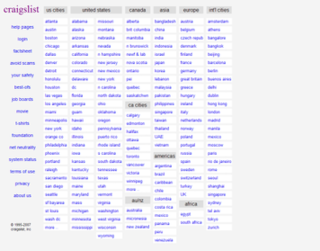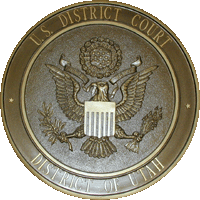Related Research Articles
The Communications Decency Act of 1996 (CDA) was the United States Congress's first notable attempt to regulate pornographic material on the Internet. In the 1997 landmark case Reno v. ACLU, the United States Supreme Court struck the act's anti-indecency provisions.
Online service provider law is a summary and case law tracking page for laws, legal decisions and issues relating to online service providers (OSPs), like the Wikipedia and Internet service providers, from the viewpoint of an OSP considering its liability and customer service issues. See Cyber law for broader coverage of the law of cyberspace.
Stratton Oakmont, Inc. v. Prodigy Services Co., 23 Media L. Rep. 1794, is a 1995 U.S. New York Supreme Court decision which held that online service providers could be held liable for the speech of their users.

Cubby, Inc. v. CompuServe Inc., 776 F. Supp. 135 was a 1991 court decision in the United States District Court for the Southern District of New York which held that Internet service providers were subject to traditional defamation law for their hosted content. The case resolved a claim of libel against CompuServe, an Internet service provider that hosted allegedly defamatory content in one of its forums. The case established a precedent for Internet service provider liability by applying defamation law, originally intended for hard copies of written works, to the Internet medium. The court held that although CompuServe did host defamatory content on its forums, CompuServe was merely a distributor, rather than a publisher, of the content. As a distributor, CompuServe could only be held liable for defamation if it knew, or had reason to know, of the defamatory nature of the content. As CompuServe had made no effort to review the large volume of content on its forums, it could not be held liable for the defamatory content.

Zeran v. America Online, Inc., 129 F.3d 327, cert. denied, 524 U.S. 937 (1998), is a case in which the United States Court of Appeals for the Fourth Circuit determined the immunity of Internet service providers for wrongs committed by their users under Section 230 of the Communications Decency Act (CDA). Section 230(c)(1) of the CDA provides that "No provider or user of an interactive computer service shall be treated as the publisher or speaker of any information provided by another information content provider."
Barrett v. Rosenthal, 40 Cal.4th 33 (2006), was a California Supreme Court case concerning online defamation. The case resolved a defamation claim brought by Stephen Barrett, Terry Polevoy, and attorney Christopher Grell against Ilena Rosenthal and several others. Barrett and others alleged that the defendants had republished libelous information about them on the internet. In a unanimous decision, the court held that Rosenthal was a "user of interactive computer services" and therefore immune from liability under Section 230 of the Communications Decency Act.

Thomas J. Dart is an American attorney, politician, and law enforcement officer serving as the Sheriff of Cook County, Illinois. He previously served as a member of both chambers of the Illinois General Assembly.

Craigslist is an American classified advertisements website with sections devoted to jobs, housing, for sale, items wanted, services, community service, gigs, résumés, and discussion forums.

Section 230 is a piece of Internet legislation in the United States that generally provides immunity for website platforms from third-party content. At its core, Section 230(c)(1) provides immunity from liability for providers and users of an "interactive computer service" who publish information provided by third-party users:
No provider or user of an interactive computer service shall be treated as the publisher or speaker of any information provided by another information content provider.

Chicago Lawyers' Committee For Civil Rights Under Law v. Craigslist, 519 F.3d 666, is a Seventh Circuit decision affirming a lower court ruling that Section 230 of the Communications Decency Act (CDA) provides immunity to Internet service providers that "publish" classified ads that violate the Fair Housing Act (FHA).

Goddard v. Google, Inc., 640 F. Supp. 2d 1193, is a case in which Jenna Goddard ("Plaintiff") alleged that she and a class of similarly situated individuals were harmed by Google ("Defendant") as a result of clicking allegedly fraudulent web-based advertisements for mobile subscription services ("MSSPs"). The United States District Court for the Northern District of California held that the action was barred by Section 230 of the Communications Decency Act ("CDA") and dismissed the complaint without leave to amend.
In Milgram v. Orbitz Worldwide, LLC, the New Jersey Superior Court held that online ticket resellers qualified for immunity under Section 230 of the Communications Decency Act (CDA), and that such immunity preempted a state law consumer fraud statute. The opinion clarified the court's test for determining whether a defendant is acting as a publisher, the applicability of the CDA to e-commerce sites, and the extent of control that an online intermediary may exercise over user content without becoming an "information content provider" under the CDA. The opinion was hailed by one observer as a "rare defeat for a consumer protection agency" and the "biggest defense win of the year" in CDA § 230 litigation.

Barnes v. Yahoo!, Inc., 570 F.3d 1096, is a United States Court of Appeals for the Ninth Circuit case in which the Ninth Circuit held that Section 230 of the Communications Decency Act (CDA) rules that Yahoo!, Inc., as an Internet service provider cannot be held responsible for failure to remove objectionable content posted to their website by a third party. Plaintiff Cecilia Barnes made claims arising out of Defendant Yahoo!, Inc.'s alleged failure to honor promises to remove offensive content about the plaintiff posted by a third party. The content consisted of a personal profile with nude photos of the Plaintiff and her contact information. The United States District Court for the District of Oregon had dismissed Barnes' complaint.

Fair Housing Council of San Fernando Valley v. Roommates.com, LLC, 521 F.3d 1157, is a case in which the United States Court of Appeals for the Ninth Circuit, sitting en banc, held that immunity under Section 230 of the Communications Decency Act (CDA) did not apply to an interactive online operator whose questionnaire violated the Fair Housing Act. However, the court found that Roommates.com was immune under Section 230 of the CDA for the “additional comments” portion of the website. This case was the first to place a limit on the broad immunity that Section 230(c) gives to service providers that has been established under Zeran v. AOL (1997).

Backpage.com was a classified advertising website founded in 2004 by the alternative newspaper chain New Times Inc./New Times Media as a rival to Craigslist.org.

Craigslist Inc. v. 3Taps Inc., 942 F.Supp.2d 962 was a Northern District of California Court case in which the court held that sending a cease-and-desist letter and enacting an IP address block is sufficient notice of online trespassing, which a plaintiff can use to claim a violation of the Computer Fraud and Abuse Act.

Florence v. Shurtleff, Civil No. 2:05CV000485, was a case in which the U.S. District Court for the District of Utah issued an order stating that individuals could not be prosecuted for posting adult content that was constitutionally protected on general access websites, nor could they be civilly liable for failing to prevent access to adult content, so long as the material is identifiable by filtering software. The order was the result of a 2005 lawsuit, The King’s English v. Shurtleff, brought by Utah bookstores, artists, Internet Service Providers and the other organizations challenging the constitutionality of certain portions of a Utah Law intended to protect minors from adult content.

Jane Doe No. 14 v. Internet Brands, Inc., DBA Modelmayhem.com, No. 12-56638, was a judicial opinion written by Judge Richard R. Clifton of the Ninth Circuit Court of Appeals reversing the district court's dismissal of diversity action alleging negligence under California law.

The Stop Enabling Sex Traffickers Act (SESTA) and Allow States and Victims to Fight Online Sex Trafficking Act (FOSTA) are the U.S. Senate and House bills that as the FOSTA-SESTA package became law on April 11, 2018. They clarify the country's sex trafficking law to make it illegal to knowingly assist, facilitate, or support sex trafficking, and amend the Section 230 safe harbors of the Communications Decency Act to exclude enforcement of federal or state sex trafficking laws from its immunity. Senate sponsor Rob Portman had previously led an investigation into the online classifieds service Backpage, and argued that Section 230 was protecting its "unscrupulous business practices" and was not designed to provide immunity to websites that facilitate sex trafficking.

The EARN IT Act of 2020 is proposed legislation in the United States Congress that is aimed to amend Section 230 of the Communications Act of 1934, which has historically allowed operators of websites to remove content from users that they deem inappropriate and provides them with immunity from civil lawsuits related to the content of such user. Section 230, which was the only surviving portion of the Communications Decency Act passed in 1996, has been attributed to allowing the Internet to flourish without fear of legal repercussions since its passage. However, a number of events in the 2010s led lawmakers to question the legal freedom that website operators have, and among other legislation options, the EARN IT Act was proposed to alter Section 230's protections and put more responsibility on website operators.
References
- 1 2 U.S. Code: Title 47,230. Protection for private blocking and screening of offensive material
- ↑ The 2009 Time 100, April 30, 2009.
- 1 2 3 4 5 6 7 8 9 10 11 12 Thomas Dart, Sheriff of Cook County v. Craigslist, Inc., 665 F. Supp. 2d 961 (N.D. Ill. Oct. 20, 2009).
- ↑ 10 charged in Internet prostitution; Illinois, Indiana ring placed ads on Craigslist, Chicago Tribune, December 23, 2007.
- 1 2 Craigslist sued for prostitution ads; Sheriff calls site 'largest source of prostitution' Chicago Tribune, March 6, 2009.
- 1 2 3 4 Dart's Complaint
- ↑ Craigslist's Motion for Judgment on the Pleadings
- ↑ Craigslist's Memo in Support of the Motion for Judgment on the Pleadings
- ↑ A Win for Internet Speech, The New York Times, October 27, 2009.
- ↑ Eric Goldman's Technology and Marketing Law Blog, October 29, 2009.